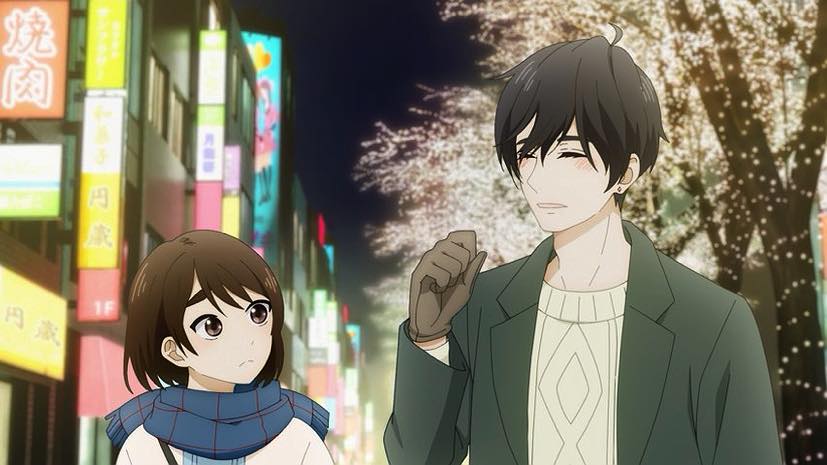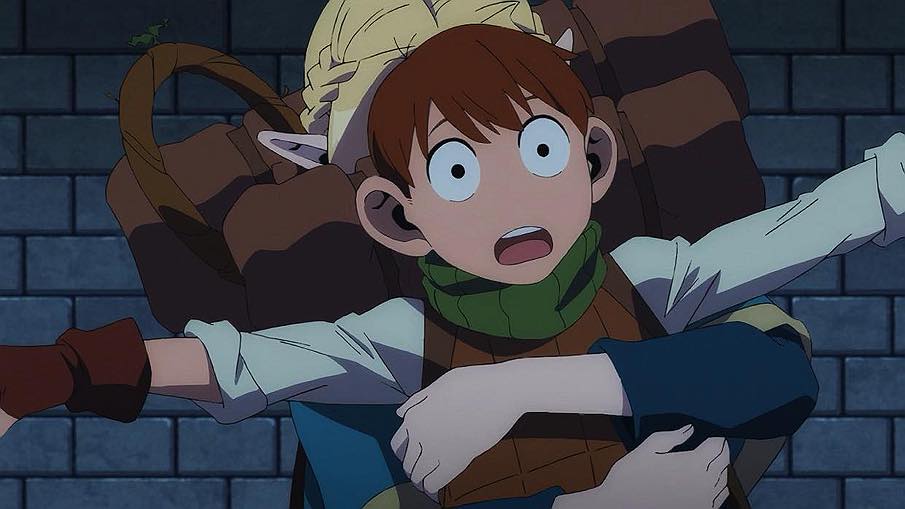So – will the relentless nattering of the Yamakan bashers settle down after the shocking third episode? Oh, probably not – dissing the guy seems to be an international sport these days, and he certainly puts his foot in his mouth often enough. But the episode certainly delivered big-time.
Back on Funimation this week with happy thoughts all around (unless you downloaded One Piece), Fractale gave us a ton of exposition and a few jarring surprises. As suspected, Enri and her brother belong to a rebel group – some (including Clain) would say a terrorist group – resisting the influence of Fractale. Calling themselves The Lost Millenium, they live in a state of comparative deprivation in a hidden village. Having removed their “terminals” they no longer receive instantaneous medical care and the other necessities of life – they have to do everything for themselves, including grow food and (such misfortune!) make coffee. Idealists they are, of a sort of Luddite school – a “back to nature” anti-technology sect that’s not unlike some you might find in the rural Western United States. They see Fractale as a cult in its own right, and Clain and all the others like him as slaves.

How does this all tie in with our heroes? According to the leader of Lost Millennium (Sunda, Enri’s big brother) Phryne is a priestess who stole secrets from the temple at the center of Fractale – “doppel data” – and hid it inside Nessa somehow. So now Clain and Nessa are basically hostages, though treated pretty well. Clain is thrilled at all the antique technology and at his first taste of real food, which Nessa can neither taste nor contextualize – so she asks him to explain taste to her in interpretive dance. An odd moment, but it works. Here’s where things take quite a turn, though – our cartoonishly drawn villains who act like Team Rocket and serve their prisoners tasty meals are actually terrorists after all.
It would be hard to imagine anyone not being surprised by the scene at the “Star Festival”, the ritual called by the Fractale Temple. Lost Millennium flies off to disrupt it with Clain and Nessa (uninvited) in tow. It turns out that the festival is basically an excuse for Fractale to update everybody’s internal software and make sure they don’t start thinking rebellious thoughts, which tends to happen after a while. Through the special glasses Sunda gives him Clain is able to see the truth – these people are being brainwashed. Lost Millennium is pretty much the good guys, eh? Then they get out the machine guns and start mowing down the priestesses and the worshipers alike. The Priestesses start to fight back and all hell breaks loose – it’s an orgy of graphic violence that catches the viewer totally off guard. Bodies and blood fly everywhere, and among the victims is Enri’s comical henchman Butcher. Through all this we see another Nessa dressed in the Priestesses’ robes – is “our” Nessa but a copy? – and none other than Phryne shows up. Nessa Mark II calls her “Onee-sama” and things are altogether a
 kerfuffle.
kerfuffle.
Where did that come from? Quite a bold and nasty turn for a series that, if anything, resembled Miyazaki’s gentler works of the 80’s. As suspected this is turning into a discourse on freedom – what it means to be free, and what price is worth paying both to give up your freedom and to try and get it back. There were no good guys in that last scene – certainly not the cult leaders brainwashing their people, and even more certainly not the “freedom fighters” gunning them down in cold blood. Clain and Nessa are good, certainly – Clain is nothing worse than naive, and Nessa is an artificial being, a walking illusion. Whether Phryne is a good guy or not seems very much in question after that ending, though in my heart I still don’t believe she’s evil. This looks like it’s going to be a pretty ambiguous morality play – and the arc is going to be Clain’s development as he realizes both the futility of existence under Fractale and the cruelty of the world outside its influence. As a techno-skeptic and an antiques otaku he would have seemed a natural recruit for Sunda, but judging by his reaction to events at the Star Festival I can’t imagine him having any sympathy for their methods. Perhaps he and Nessa will end up on the run, isolated from both sides.
That was a wonderful feint by Yamakan – if he can continue to surprise and engage the way he did in this episode, even his critics might have to take a vow of silence – for a few moments, anyway.





0utf0xZer0
January 30, 2011 at 9:12 pmTo be fair, I’ve never had a problem with Yamakan’s talent and I find many of his foot in mouth moments more funny than anything else. My issue is that I think that his industry criticism – particularly anything related to Kyoto and the trends they deal in – needs to be taken with a grain of salt given his ego. Some posters seem to just eat up his comments on that subject.
This being said, I think you may be giving Yamakan too much of the credit for where Fractale is going. He’s the director, but he’s not the one writing the series. Even if Yamakan provided input, writing the series is Hiroki Azuma’s job.
I’ve heard a few people describe Fractale as post scarcity sci-fi, and while that’s technically the case – data can generally just be copied – I don’t think it’s quite what Azuma is going for. Remember, Azuma is fairly famous in anime-criticism circles for advocating the theory of modern visual culture as drawing from a “database” of traits – which implies that what’s new is the combinations, not the traits. In light of this, I can’t help but note the title Fractale itself and the use of visualizations of fractales in the OP – a Fractale is a mathematical construct. I don’t know what role that’s going to play in the story, exactly, but I’m eager to find out.
As for episode 3’s developments, well, I’m certainly interested in seeing what happens next and (especially) who Phryne and Nessa actually are. I liked the plot twist surrounding the rebel’s brutality but found the sudden transition of the characters in question into violence mode a bit hard to take seriously, probably because they played their archetypes (baffoonish and hot blooded, depending on the character) a bit too straight earlier in the episode/series. Actually, I have to say that’s my one major annoyance with Azuma’s writing: he’s taking this “character from a database” thing too seriously. As someone who dabbles in novel writing on occasion myself, I’m well aware that authors often grab elements from all over the place – but I also try and flesh them out with little subtleties and put my own stamp on them. Azuma just seems to have taken the stock archetypes he wants and played them either straight or “straight twisted”, if you get what I mean. That may be intended as meta-commentary of a sort, but I can’t say I care much for it. As it stands, I’m watching this for the plot and to be able to analyze it – the characters are not that compelling.
0utf0xZer0
February 2, 2011 at 8:49 amI swear I posted this a few days back, but I guess either I messed up or blogspot ate the comment:
To be fair, I’ve never had a problem with Yamakan’s talent and I find many of his foot in mouth moments more funny than anything else. My issue is that I think that his industry criticism – particularly anything related to Kyoto and the trends they deal in – needs to be taken with a grain of salt given his ego. Some posters seem to just eat up his comments on that subject.
This being said, I think you may be giving Yamakan too much of the credit for where Fractale is going. He’s the director, but he’s not the one writing the series. Even if Yamakan provided input, writing the series is Hiroki Azuma’s job.
I’ve heard a few people describe Fractale as post scarcity sci-fi, and while that’s technically the case – data can generally just be copied – I don’t think it’s quite what Azuma is going for. Remember, Azuma is fairly famous in anime-criticism circles for advocating the theory of modern visual culture as drawing from a “database” of traits – which implies that what’s new is the combinations, not the traits. In light of this, I can’t help but note the title Fractale itself and the use of visualizations of fractales in the OP – a Fractale is a mathematical construct. I don’t know what role that’s going to play in the story, exactly, but I’m eager to find out.
As for episode 3’s developments, well, I’m certainly interested in seeing what happens next and (especially) who Phryne and Nessa actually are. I liked the plot twist surrounding the rebel’s brutality but found the sudden transition of the characters in question into violence mode a bit hard to take seriously, probably because they played their archetypes (baffoonish and hot blooded, depending on the character) a bit too straight earlier in the episode/series. Actually, I have to say that’s my one major annoyance with Azuma’s writing: he’s taking this “character from a database” thing too seriously. As someone who dabbles in novel writing on occasion myself, I’m well aware that authors often grab elements from all over the place – but I also try and flesh them out with little subtleties and put my own stamp on them. Azuma just seems to have taken the stock archetypes he wants and played them either straight or “straight twisted”, if you get what I mean. That may be intended as meta-commentary of a sort, but I can’t say I care much for it.